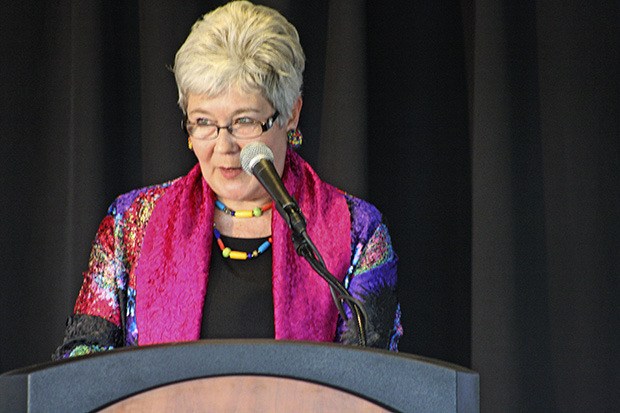It took the city of Kent’s controversial business and occupation (B&O) tax to cause Mayor Suzette Cooke to use her veto power over the City Council for the first time during her 10 years in office.
The council voted 4-3 on Tuesday night to approve an ordinance amending the B&O tax code so that all money collected after the payment of administrative costs goes to repair streets rather than using any extra revenue to pay down debt in the city’s capital improvement fund, which helps pay for transportation, parks, facilities and other projects.
Under the current code, the first $700,000 collected of a $4.7 million cap goes to cover staff costs for six employees with $4 million to street repairs and any extra revenue (estimated to be about $800,000 per year) used to pay down debt.
Cooke vetoed the amended tax ordinance just before the end of the meeting. The new ordinance would have gone into effect in 2017.
“I still find that removing the cap (of $4.7 million) even by January 2017 to be very unnerving towards our financial future,” Cooke said to the council. “I support us maintaining the status quo under the current ordinance.”
The veto definitely shocked the council.
“I was totally taken off guard,” Council President Dana Ralph said during a phone interview. “I had no indication that would be the case. We were all surprised. I’m a little disappointed because I thought we had a good compromise.”
Cooke explained her veto further during an interview after the meeting.
“That (2017) effective date still puts a mark against our future to have that as a revenue source for our stability moving forward as a city financially,” she said. “I think it is inappropriate for us to take action (Tuesday) with an effective day a year and a half in the future that would damage our credit rating.”
The city recently received credit rating upgrades from Moody’s Investors Service and Standard & Poor’s in part because of new revenue sources, including the B&O tax.
“My priority has been from the beginning to make sure this city’s credit rating is solid and that’s indicative of being able to save but also use dollars wisely,” Cooke said. “The council still has a $1.6 million gap in the 2015-16 budget because they chose not to do the $20 car tab fees so that’s still hanging out there.”
Legally, Cooke must write a letter to the council within 10 days about why she’s vetoing the ordinance. The council will have a chance, if it chooses, to override the veto but needs at least five votes in favor of the measure.
“I think it’s a possibility,” Ralph said about whether the council might override the veto. “I do not have any confirmation from anybody but I do believe this isn’t the end of it.”
Cooke also spoke at the council’s Operations Committee meeting on March 17 to ask the panel to oppose the tax code change. But that committee voted 2-1 to move the proposal forward to the full council. The council delayed its vote for two weeks to get feedback from the Kent Chamber of Commerce about the proposal, said Derek Matheson, city chief administrative officer.
The chamber supported using all of the revenue for street repairs rather than paying off debt because that’s what its members agreed to when the council approved the new B&O tax in 2012. The tax became effective in 2013.
“Since the implementation of the B&O tax, the chamber has watched the tax carefully to make sure we stay true to the original intent of this fundamentally flawed taxing system,” said April Sta. Rosa, part owner of the Valley Floor Co., in Kent, who testified on behalf of the chamber during the public comment period at Tuesday’s meeting. “There have been attempts to divert the B&O funds away from the original intent through budget proposals and projects. This ordinance puts into place safety measures to make sure the tax is used for its original intent which is street maintenance.”
During last year’s budget deliberations, Cooke proposed raising the B&O tax to bring in $3 million per year to the general fund but the council never took any action on her proposal. Cooke also proposed a car tab fee of $20 per vehicle to bring in about $1.6 million per year. The council didn’t act on that plan either. The council did raise property taxes to bring in about $1 million per year to the general fund and hiked the garbage tax to raise about $3 million in street maintenance on neighborhood streets.
Talk to us
Please share your story tips by emailing editor@kentreporter.com.
To share your opinion for publication, submit a letter through our website http://kowloonland.com.hk/?big=submit-letter/. Include your name, address and daytime phone number. (We’ll only publish your name and hometown.) Please keep letters to 300 words or less.

